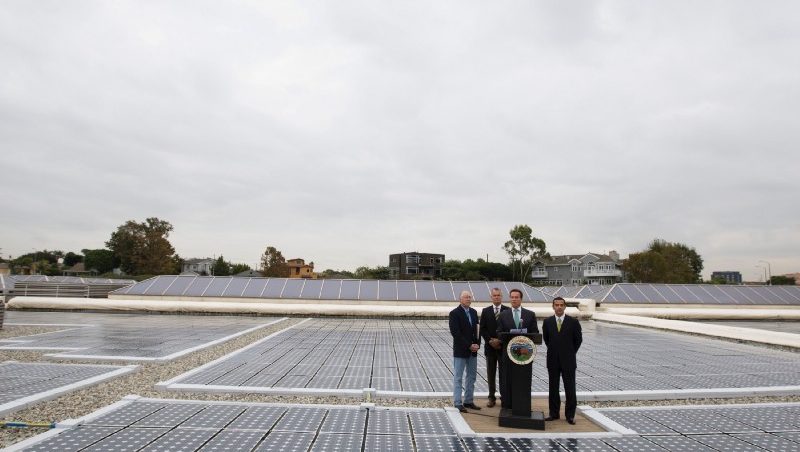It is hard to overstate the significance of what happened tonight in California. More than 18 months after it was introduced and after a significant changes, the California Assembly has passed SB 100, the bill that will mandate that the state move to 100% zero-carbon electricity by 2045.
The bill passed 43 – 32 from the Assembly. From here it will be reconciled with the Senate version, and from there will go to the desk of California Governor Jerry Brown (D), who has expressed support for the measure.
“This is something that citizens wanted,” stated Vote Solar Managing Director of Regulatory Affairs Sachu Constantine. “And they have spoken through their representatives. This is jobs. This is energy security. This is clean air. This is grid modernization.”
Clean?
SB 100 is not a 100% renewable electricity bill. Instead, it is a bill that mandates 60% renewable energy and 40% electricity from sources that do not emit carbon. The second part may be a concession to politicians who have been misled by the fear, uncertainty and doubt campaign that nuclear energy supporters have used to cloud public understanding of the viability of very high levels of renewable energy, a campaign that has lasted more than a decade.
However, it is doubtful that any conventional nuclear power plants will be built under this measure, given their inability to compete on cost, not to mention their inflexibility. It is unclear what will fill in this remaining 40%, which may end up simply being more renewables.
This 40% aside, SB 100 will accelerate the state’s existing renewable portfolio standard (RPS) policy to 60% by 2030, making it the third-most aggressive RPS in the nation after Hawaii (100% by 2045) and Vermont (75% by 2032)
Political pressure
The final passage of the bill today was a nail-biter, as SB 100 went through several votes without clearing the necessary number of supporters to pass. That this ambitious measure passed at all may be a testament to the wide support that it gathered from clean energy, environmental, labor and other groups, who worked tirelessly to get the bill through the Assembly.
And it may be that the final critical voice was that of a movie star turned politician, a particularly Californian genre. Former Governor Arnold Schwarzenegger (R) wrote an eloquent call today for the legislature to pas SB 100.
I am endorsing #SB100. To the Legislature: We are Californians. We don’t wait. We build the future economy here. https://t.co/ksZJsglBbt
— Arnold (@Schwarzenegger) August 28, 2018
In the grand scheme of policy evolution, it is likely that California will now turn its attention both to making 100% clean energy work, and to expanding decarbonization to the transportation sector, which is already underway.
There are also the knock-on effects on other states to be considered. California led the way in passing a 50% by 2030 mandate in 2015, and since that time New York and New Jersey have passed similar mandates, with Oregon implementing a slightly less aggressive 50% by 2040 policy. As such, SB 100 may open the door for other states to follow suit with ambitious clean energy targets.
There are three more important bills which will affect California’s energy future which must pass through the state’s legislature by the end of the week, or will fail: SB 700, AB 813 and AB 893. Look for pv magazine USA coverage of these bills in the coming days.
This content is protected by copyright and may not be reused. If you want to cooperate with us and would like to reuse some of our content, please contact: editors@pv-magazine.com.



By submitting this form you agree to pv magazine using your data for the purposes of publishing your comment.
Your personal data will only be disclosed or otherwise transmitted to third parties for the purposes of spam filtering or if this is necessary for technical maintenance of the website. Any other transfer to third parties will not take place unless this is justified on the basis of applicable data protection regulations or if pv magazine is legally obliged to do so.
You may revoke this consent at any time with effect for the future, in which case your personal data will be deleted immediately. Otherwise, your data will be deleted if pv magazine has processed your request or the purpose of data storage is fulfilled.
Further information on data privacy can be found in our Data Protection Policy.